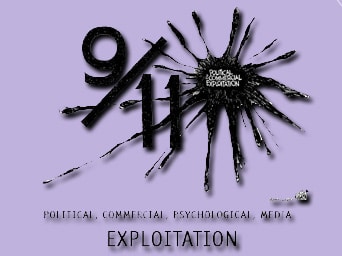 Exploitation of September 11th
Exploitation of September 11th
By Bobby Hanifin
With the 10th Anniversary of September 11th fast approaching. I, for one, am getting tired of (or is it immune to) how every politician – regardless of ideology, most mainstream media [propaganda] outlets, and especially the Pentagon has exploited 9/11 for political, ideological, psychological, and propaganda motives and effect.
It is understandable that the people of New York City, residing near a field in Pennsylvania, and especially those who run the Pentagon don’t want us to ever forget- these were t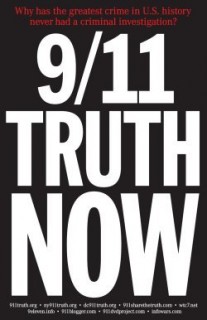 he unfortunate targets.
he unfortunate targets.
I realize that not everyone has of course forgotten Pearl Harbor, especially survivors, but in comparison to 9/11 how long was the attack on Pearl exploited for political, ideological, and media propaganda effect?
It would be fair to say that politicians, sunshine patriots, patriots, the media, and let’s not forget the U.S. Propaganda apparatus of WWII exploited the Attack on Pearl Harbor for about as long as the Second World War lasted, or at least until the surrender of Japan in 1945. The decision to drop the first A-Bomb on a civilian population, and the U.S. Occupation of Japan did of course take into consideration the Attack on Pearl Harbor.
There will remain political, cultural, sociological, psychological, and military motives to keep exploiting 9/11 as long as the Global War on Terror, even if we no longer call it that, continues.
I did not cover the views and observations of 9/11 Truth, not because I advocate same views or not, but because there are writers on, and readers of, VT much smarter than I on articulating those beliefs. My focus is on Veterans Issues and Peace Activism NOT the Truth behind 9/11. I’m simply fed up with the never ending EXPLOITATION of September the 11th.
Robert L. Hanafin, Veterans Issues Editor, VT News
Exploitation of September 11th in All Forms
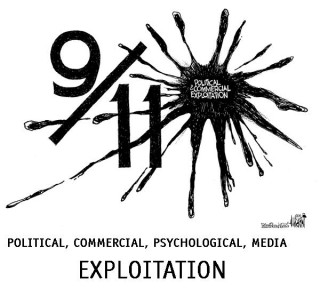 Because September 11th has continuously been exploited for ulterior motives does not mean people should not commemorate the anniversary anymore than folks should ignore the anniversaries of Afghanistan and Iraq. However, the mass media war drum beat toward that began early in 2011.
Because September 11th has continuously been exploited for ulterior motives does not mean people should not commemorate the anniversary anymore than folks should ignore the anniversaries of Afghanistan and Iraq. However, the mass media war drum beat toward that began early in 2011.
There are at least 40 different TV specials planned leading up to that awful date of September 11th.
Each of the top three networks – ABC, CBS, and NBC has an awesome special planned, plus extra coverage on their early morning and evening news programs. CNN has no fewer than four separate documentaries on the 9-11 attacks scheduled. The National Geographic Channel plans to devote a full week to its coverage. Public Broadcasting Service (PBS) needs to get in on the exploitation as well as countless other cable channels that have their own 9-11 plans. And, of course, just wait till you see the onslaught of coverage from your local news stations.
Lame stream media coverage of September 11th will be non-stop at frenzy level as the date approaches. Some critics will say overload , I say never ending exploitation of an American tragedy. I don’t plan to watch any of the televised rehash of that awful day, because it remains USED to justify REVENGE against the Arab, if not Muslim world, but most of all I resent it being exploited as propaganda to keep our troop volunteering for multiple combat zone tours that most young Americans in their right minds would NEVER volunteer for.
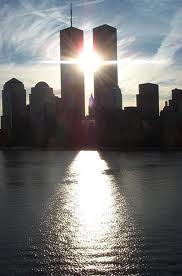 Regardless, the fact remains that it was the worst attack on American soil in recent history. Our whole world changed that day. Some of us no longer felt that America was the safest country on the planet. Others felt they could no longer rely on any of our pre-conceived notions about security and our country’s standing in the world.
Regardless, the fact remains that it was the worst attack on American soil in recent history. Our whole world changed that day. Some of us no longer felt that America was the safest country on the planet. Others felt they could no longer rely on any of our pre-conceived notions about security and our country’s standing in the world.
If people continue to feel perpetually vulnerable – FEAR- since September 11, 2001, we have continuous exploitation to thank for that FEAR. However, over the years, some, maybe not enough, of us notice our buried indignation begin to simmer when we are asked to surrender our identification to get into a building or when we go through an airport security line and a stern looking fellow American looks suspiciously at every aspect of our being. BTW-who monitors those who monitor us?
There are far fewer smiles in America these days, almost no idle conversation among strangers and everyone seems so distrustful of others, even other Americans. There has been an explosion of security cameras snapping our pictures nearly everywhere we go for the private security industry has also made a killing on exploiting 9/11. Some of us understand why it must be this way now – but it pains us to know the carefree (or FREE) America we grew up in is gone.
It all began to change on September 11th, 2001.
Now, the very idea of watching a re-play of the country’s worst terrorist attack on any one of the 40 upcoming TV specials seems far more than pointless, and the exploitation is so blatant and obvious except to the most ignorant among us.
That said, the exploitation of 9/11 seems barbarically sadistic. A lot of Americans still carry the scab where the terrorist’s mortally wounded our country. To deny that tears still flow at the memory of that day and the immediate aftermath would be the same as denying the exploitation of the event. However, this question remains for lord only knows it will be asked when the 20th anniversary of 9/11 is exploited.
Do we really need a periodic televised reminder of what happened, who did it or what it all means?
On September 11th, those fed up with the exploitation will stay in bed with for a few extra minutes and silently, reverently remember the anniversary in our own way. We will not turn on the television.
EXPLOITATION was the most popular immediate reaction to 9/11
Of course exploitation of September 11th is nothing new. A little over seven years after the attacks (on October 20, 2007), a renewed conversation began happening out there in the blog-o-sphere about exploitation. The most prominent examples of 9/11 exploitation and culture are:
– Political Propaganda. On the right-wing, this trailer for DC 9/11: Time of Crisis, was a bizarrely hyper-real made for tv movie, launched George W. Bush’s re-election campaign. On the left, Fahrenheit 9/11 was pretty egregious with its panning shot of missing persons flyers and more. Director David Zucker tried to tip election ’08 by resurrecting 9/11 twice in An American Carol, once in the linked scene as “crazy christians” take over a plane cockpit and another time as George Washington leads its Moore-esque main character from the National Cathedral to the ruins of WTC 1 & 2. Again and again, those towers just keep popping up in campaign advertising.
9/11 billboard draws flak from Florida Democrats, GOP
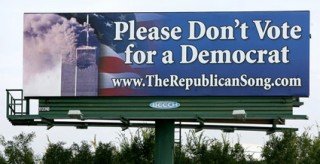 Although politicians from across the political spectrum have exploited 9/11 for political motives, I believe the Republicans have been and remain the EXPERTS at USING September the 11th. It remains to be seen just how much political and progaganda yardage the Tea Party can get from 9/11.
Although politicians from across the political spectrum have exploited 9/11 for political motives, I believe the Republicans have been and remain the EXPERTS at USING September the 11th. It remains to be seen just how much political and progaganda yardage the Tea Party can get from 9/11.
Back in 2008, a Florida man used billboards with an image of the burning World Trade Center to encourage votes for a Republican presidential candidate, drawing criticism for politicizing the 9/11 attacks.
“Please Don’t Vote for a Democrat” reads the type over the picture of the twin towers after hijacked airliners hit them on September, 11, 2001.
Mike Meehan, a St. Cloud, Florida, businessman who paid to post the billboards in the Orlando area, said former President Clinton should have put a stop to Osama bin Laden and al Qaeda before 9/11. He said a Republican president would have done so.
“I believe 9/11 could have been prevented if we’d had a Republican president at the time,” Meehan told CNN’s “American Morning.”
But Democrats and Republicans said Meehan shouldn’t be using a 9/11 image to make a political point.
“This is a blatant exploitation of that terrible tragedy for political and, perhaps even worse, personal gain,” Bill Robinson, the Orange County, Florida, Democratic Party chairman told CNN affiliate WFTV-TV in Orlando.
The local Republican Party called the billboard “inappropriate,” according to WFTV.
“There are many ways to convey the importance of national security in this election without going to extremes, and we encourage a constructive dialogue,” the Florida Republican Party said in a statement condemning the billboards.
According to Meehan, President Bush has done “an excellent job … going after these terrorists.”
You got to remember all the … people that George Bush did catch and how much success he did have. And we haven’t had an attack on this soil since 9/11,” Meehan said. “Unlike Bill Clinton, who actually had bin Laden right in his hands and through the CIA and other high officials decide to get him go,” Meehan said.
In a 2006 interview with “Fox News Sunday,” Clinton said he authorized the killing of bin Laden in 2000 after the attack on the Navy warship USS Cole in Yemen, but the order was never carried out because U.S. intelligence and law enforcement agencies refused to certify that bin Laden was behind the Cole attack.
“I got closer to killing him than anybody has gotten since,” Clinton said in the 2006 interview.
Meehan was also is using the billboard to promote his Web site, the republicansong.com, where he’s trying to sell copies of his song, “Please Don’t Vote for a Democrat.”
The song goes beyond the national security issue, ripping Democrats on taxation and energy issues, too.
“They want to take the money from the hard workin’ man, and give it to the lazy folks that don’t give a damn,” Meehan sings.
Another verse takes on the oil issue.
“We’re not fightin’ for oil, we got plenty if we drill it,” he sings.
The song’s not a moneymaker, he said, just an effort to recoup some of what he’s invested in the billboards.
A copy of the song on CD cost $5 on the Web site, and the site points out that Meehan can be hired to perform at a “concert, party, meeting or event.”
“I’m willing to pay the cost for the fact that our soldiers that have died protecting this country have paid a heck of a lot more than what these billboards cost,” Meehan told “American Morning.”
Florida resident Mary Anderson told WFTV she doesn’t see politics when she’s looking at the billboard.
“Just looking at it, I’m not thinking about Democrat or Republican, I’m thinking about the twin towers and all the people killed,” she told WFTV.
However, Meehan gives inspirational credit for his song, if not his billboards, to right-wing talk radio and the FOX TV network.
“The Republican Song title is actually “Please Don’t Vote For a Democrat.” The song was written, played, sang, produced, and recorded by myself though I would like to thank Sean Hannity, Mike Huckabee, Glen Beck at Fox News and Rush Limbaugh talk radio host for their inspiration to do more than just listen and watch while we are being attacked in more ways than one. I love this great nation, “The United States of America.” Mike Meehan
I wrote this song to encourage and motivate as many people as possible not to vote for a “Democrat” in the 2008 Presidential Election.
–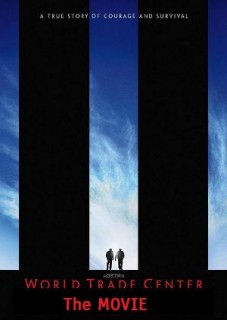 Commercial and Non-Commercial Advertising regularly mine the death imagery and patriotic fervor associated with September 11th. During Super Bowl ’02, Budweiser had its then-spokes-animals bow towards Manhattan. This 2006 ad for Chevy uses a catchy John Cougar Mellencamp song and a photo of the lights erected at “Ground Zero” to firmly place the brand within the bounds of authentic Americana (pay attention for the gratuitous Katrina shots as well). Copyranter has a wonderful collection of exploitative print ads, many produced by non-profit organizations comparing deaths associated with their causes—such as smoking cigarettes or lacking access to clean water—to deaths on 9/11.
Commercial and Non-Commercial Advertising regularly mine the death imagery and patriotic fervor associated with September 11th. During Super Bowl ’02, Budweiser had its then-spokes-animals bow towards Manhattan. This 2006 ad for Chevy uses a catchy John Cougar Mellencamp song and a photo of the lights erected at “Ground Zero” to firmly place the brand within the bounds of authentic Americana (pay attention for the gratuitous Katrina shots as well). Copyranter has a wonderful collection of exploitative print ads, many produced by non-profit organizations comparing deaths associated with their causes—such as smoking cigarettes or lacking access to clean water—to deaths on 9/11.
– Those in Pursuit of Cheap Emotional Pull such as the incredible ending scene of Remember Me (which may be one of the best examples), but equally exemplary is the entirety of Jonathan Safran Foer novel Extremely Loud and Incredibly Close. Retelling the story of 9/11 through the eyes of a nine-year-old who has lost his father in the attack, Foer’s story is cloying, manipulative, and shallow (truly it is “heavy boots.”) In Julie and Julia (available on Netflix Instant), the audience is expected to feel something for Julie Powell, a WTC Helpline operator charged with commiserating with the families of 9/11 victims, but nothing can overcome this character’s essentially preening personality. Sadly, Reign over Me, some Adam Sandler Oscar-bait is just boring. And finally, from the left and the right, Bruce Springsteen’s The Rising and Toby Keith’s Courtesy of the Red, White, and Blue intend to stoke a similar sort of patriotic jingoism.
What 9/11 Wrought – September 2011
While waiting for a medical appointment at the Wright-Patterson AFB Medical Center, I picked up the latest copy of the Smithsonian Magazine in which Joseph Lelyveld the former editor of the New York Times wrote an article that considers the effects of the terrorist attacks on the upcoming 10th anniversary of 9/11.
The part that interested me most as the Veterans Issues and Peace Activism Editor for VT is Mr. Lelyveld’s insight into the lack of burden sharing when it comes to the American people continuously seeking REVENGE for 9/11.
“While we mourn the thousands killed and grievously wounded in combat in Iraq and Afghanistan, the hard truth is that the more privileged and better educated we are, the less likely we are to have any direct acquaintance with them or their families. At the end of the decade, many of us pay lower taxes than ever before and have suffered no worse inconvenience than having to shed our shoes and, sometimes, belts as we pass through airport checkpoints. Beyond that, how have we been affected, how changed?” Joseph Lelyveld
Lelyveld goes on to say that: The military had a name for it—“asymmetric warfare.” But until 9/11 hardly anyone imagined how surreal and coldblooded, how devastating, it could actually be: that 19 would-be suicides from distant parts, armed only with box-cutters, their leaders trained to fly but not land airliners, could bring the greatest military power the world had seen momentarily to its knees, with a loss of lives on that perfect late-summer morning surpassing that inflicted by the Japanese at Pearl Harbor.
With video clips edited to remove scores of bodies flying through the air, what was shoved in our faces on our TV screens hundreds of times in the days that followed 9/11 was still close enough to the full horror: the planes serenely cruising into the towers over and over again, the vile, bilious clouds of smoke and debris that repeatedly engulfed the buildings as they kept falling; the feeling of utter vulnerability, heightened by images of further wreckage and loss at the Pentagon and in a Pennsylvania field; all followed by rage.
Ten years on, all of that and more—including the spontaneous surge of flag-flying patriotism and civic determination—can instantly be recalled by anyone who experienced it the first time. What’s harder to recall is the sense that it was only the beginning, that “the homeland,” as the authorities came to call it, would surely be assaulted on a wide variety of fronts. A flurry of anthrax attacks of mysterious origin deepened such premonitions. Think-tank scenarists cataloged a broad range of nightmare possibilities: suicide bombers boarding subways, infiltrating malls and multiplexes; the millions of containers unloaded in our harbors available to deliver dirty bombs; our chemical plants and the rail lines that serve them wide open to attack; our great bridges brought down. Worst of all, small nuclear devices containing radioactive material smuggled from Russian, Pakistani or (so some imagined) Iraqi stockpiles that could be hand-carried into our population centers, places like Times Square, and detonated there, causing mass panic and death on a scale that would make 9/11 look like a practice run. For a time, it seemed that none of this was impossible, even improbable, and we needed to act. What was initially branded the Global War on Terror—a struggle without geographic or temporal limits—was the result.
We Overreacted and Overreached
It may not be inappropriate on this anniversary to acknowledge that we overreacted and overreached, but that wasn’t so apparent a decade ago. Hardly anyone imagined then that all this time could pass—a period longer than our active involvement in World War II and the Korean War combined—with no large-scale recurrence of the original outrage on our territory. Other than a shooting rampage on a Texas military base, the most visible attempts have been failures: a shoe bomb on a trans-Atlantic flight, a car bomb off Broadway, a young Nigerian who sat aboard a Detroit-bound airplane with plastic explosives hidden in his jockey shorts.
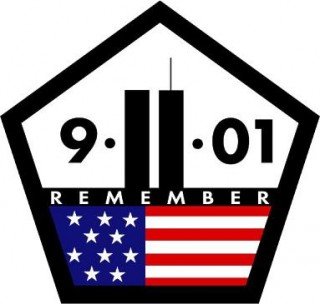 While we mourn the thousands killed and grievously wounded in combat in Iraq and Afghanistan, the hard truth is that the more privileged and better educated we are, the less likely we are to have any direct acquaintance with them or their families. At the end of the decade, many of us pay lower taxes than ever before and have suffered no worse inconvenience than having to shed our shoes and, sometimes, belts as we pass through airport checkpoints. Beyond that, how have we been affected, how changed?
While we mourn the thousands killed and grievously wounded in combat in Iraq and Afghanistan, the hard truth is that the more privileged and better educated we are, the less likely we are to have any direct acquaintance with them or their families. At the end of the decade, many of us pay lower taxes than ever before and have suffered no worse inconvenience than having to shed our shoes and, sometimes, belts as we pass through airport checkpoints. Beyond that, how have we been affected, how changed?
One answer that’s plausibly advanced is that our civil liberties have been eroded and our concern for individual rights—in particular, the rights of those we deem alien—has been coarsened by the steps our government has felt impelled to take to protect us from lurking threats: using new technology to sort and listen to phone calls by the millions without judicial warrants; rounding up and deporting Muslim immigrants by the thousands when there was anything dubious about their status; resorting to humiliation, physical stress and other “enhanced” methods of interrogation, sometimes amounting to torture, in cases of supposedly “high-value” terrorism suspects; making new claims for the authority of the executive branch to wage war in secrecy (including the breathtaking claim that our president had the constitutional authority to imprison indefinitely, without trial, any person on the planet he deemed an “unlawful enemy combatant”). One can debate the extent to which these things have happened or continue to happen. That’s one set of questions that might have been addressed had not proposals to appoint a nonpartisan commission to explore them been permanently shelved. Even so, lacking the authoritative narrative such a commission might have provided, we can still ask whether we’ve been affected or changed. Could it be that we don’t really mind the blurriness, that whatever was done secretly in the name of our security happened with our silent assent?
That’s a question I started asking myself on a reporting trip to Guantánamo in 2002, less than a year after the American naval base in Cuba was transformed into a warehouse for supposed terrorists rounded up on the Afghan-Pakistani frontier. Many of the guards had worked as correctional officers in their civilian lives. When I asked to meet some of them, I was introduced to two women normally employed in state prisons in Georgia. The harsh conditions in which the supposed terrorists were held, they told me, were a little harder than normal “segregation” for troublesome prisoners in the Georgia system, but not nearly so hard as Georgia-style “isolation.” I took this to be expert testimony. It helped me realize how little we’re normally inclined to question decisions taken, so we’re told, in the interest of our own security. If there was no big difference between prison conditions in Georgia and Guantánamo, who but a certified bleeding heart could call into question the guidelines for treatment of “terrorists” classed by a Pentagon spokesman as “the worst of the worst”?
Years later, we’d be told there was no hard evidence linking at least one-fifth—and possibly many more—of the Guantanamo detainees to terrorist movements. This belated coming to grips with the facts of each case could have been written off as carelessness were it not for the foresight displayed by members of Congress who legislated a provision barring lawsuits by Guantanamo detainees on any grounds. Suspicion alone, it seemed, was enough to keep them in the category of “the worst,” if not “worst of the worst.”
There’s the Question of What This Tells Us About Ourselves.
Beyond the constitutional, legal and even moral issues bound up in the matter of prisoner treatment, there’s the question of what this tells us about ourselves. Here again, we learn that we’ve cultivated a certain unacknowledged hardheartedness in our response to the enduring outrage of 9/11, that we’ll tolerate a large amount of “collateral damage” when it occurs out of view, far from our shores. By the time George W. Bush stood for re-election, most voters knew enough to understand that the invasion of Iraq had proved a questionable response to the events of that searing September morning; that the war, which was supposed to be over in months, was not going well, with no end in sight; and there was irrefutable evidence of prisoner humiliation and abuse, amounting to torture, at Abu Ghraib prison and elsewhere. From all this, key swing voters apparently concluded that in defense of the homeland, the president was more likely to hit back too hard than too softly. Evidence that such conclusions worked in his favor could be found in the failure of his opponent [Senator John Kerry] to bring up torture as an issue. Polling, it could be surmised, had shown that a referendum on this question would favor the candidate who coupled an assurance that the United States never resorts to torture with an assurance that he’d do whatever it took to protect the country. The American people, the president’s strategists evidently concluded, wanted it both ways. If our contradictions were not called to our attention, we were as capable as any other population of double-think, the survival art of holding two conflicting thoughts in our minds.
Even after we elected a president with the middle name Hussein and the proclaimed intention of closing the prison at Guantánamo, we continued to want it both ways. Guantánamo stayed open after members of Congress from the new president’s own party deserted him when he proposed moving the remnant of detainees there—those regarded as too dangerous to be freed—to a super-maximum-security prison in Illinois. Similarly, plans to bring the admitted mastermind of the 9/11 attacks to Manhattan to stand trial in a federal court had to be abandoned. A broad consensus formed around the notion that none of these people could be allowed to set foot in our land if their mere presence here entitled them to constitutional protections we routinely extend to drug traffickers, serial killers and sexual predators. Military justice was good enough—possibly too good—for terrorists who schemed to take innocent lives by the thousands.
In more ways than one, such distancing has been a strategy. The primary point of the global war, after all, had been to pursue and engage terrorists or would-be terrorists as far as possible from our shores. After nearly ten years in Afghanistan and eight in Iraq, our war planners may say the world is better without the Taliban in Kabul or Saddam Hussein in Baghdad, but it’s the conclusions  Afghans and Iraqis will draw that should count, after years of living with the possibility of sudden death or ghastly injury to themselves or their loved ones. That’s to acknowledge that many more Afghans and Iraqis have died in our war than Americans. Probably it could not have been otherwise, but that obvious calculation is one we seldom have the grace to make. We pride ourselves on our openness and plain speaking, but we have shown we can live with a high degree of ambiguity when it serves our interests; for instance, in our readiness to turn a blind eye to inimical efforts of our allies—a Saudi autocracy that pours untold millions into proselytizing campaigns and madrassas on behalf of militant Wahhabi Islam, and the Pakistani military, which allowed the worst examples of nuclear proliferation on record to be carried out on its watch, which still sponsors terrorist networks, including some that have clashed with our troops in Afghanistan, and which almost certainly harbored Osama bin Laden until he was hunted down this past May by Navy Seals in a garrison town about an hour’s drive from Islamabad. We need access to Saudi oil, just as we need Pakistani supply routes to Afghanistan and tacit permission to conduct drone attacks on terrorist enclaves on the frontier. These are matters that we, as a people, inevitably leave to hardheaded experts who are presumed to know our interests better than we do.
Afghans and Iraqis will draw that should count, after years of living with the possibility of sudden death or ghastly injury to themselves or their loved ones. That’s to acknowledge that many more Afghans and Iraqis have died in our war than Americans. Probably it could not have been otherwise, but that obvious calculation is one we seldom have the grace to make. We pride ourselves on our openness and plain speaking, but we have shown we can live with a high degree of ambiguity when it serves our interests; for instance, in our readiness to turn a blind eye to inimical efforts of our allies—a Saudi autocracy that pours untold millions into proselytizing campaigns and madrassas on behalf of militant Wahhabi Islam, and the Pakistani military, which allowed the worst examples of nuclear proliferation on record to be carried out on its watch, which still sponsors terrorist networks, including some that have clashed with our troops in Afghanistan, and which almost certainly harbored Osama bin Laden until he was hunted down this past May by Navy Seals in a garrison town about an hour’s drive from Islamabad. We need access to Saudi oil, just as we need Pakistani supply routes to Afghanistan and tacit permission to conduct drone attacks on terrorist enclaves on the frontier. These are matters that we, as a people, inevitably leave to hardheaded experts who are presumed to know our interests better than we do.
A skeptical journalist’s way of looking at the past decade leaves out much that might well be mentioned—the valor and sacrifice of our fighters, the round-the-clock vigilance and determination (not just the transgressions) of our thousands of anonymous counterterrorists, the alacrity with which President Bush reached out to Muslim Americans, his successor’s efforts to live up to his campaign pledges to get out of Iraq and turn the tide in Afghanistan. That said, if history permitted do-overs, is there anyone who would have gone into Iraq knowing what we now know about Saddam’s defunct programs to build weapons of mass destruction, let alone the level of our casualties, sheer cost or number of years it would take to wind up this exercise in projecting our power into the Arab world? True, under various rubrics, our leaders offered a “freedom agenda” to the region, but only a propagandist could imagine that their occasional speeches inspired the “Arab spring” when it burst forth this year.
The Global War on Terror is No Longer a Good Sales Pitch, but How will we know when it’s over?
As we enter the second decade of this struggle, we have gotten out of the habit of calling it a global war. But it goes on, not limited to Afghanistan and Iraq. How will we know when it’s over—when we can pass through airport security with our shoes on, when closing Guantánamo is not unthinkable, when the extraordinary security measures embodied in the renewed Patriot Act might be allowed to lapse? If, as some have suggested, we’ve created a “surveillance state,” can we rely on it to tell us when its “sell by” date has arrived? On the tenth anniversary of 9/11, it’s possible, at least, to hope that we’ll remember to ask such questions on the 20th [anniversary].
Readers are more than welcome to use the articles I’ve posted on Veterans Today, I’ve had to take a break from VT as Veterans Issues and Peace Activism Editor and staff writer due to personal medical reasons in our military family that take away too much time needed to properly express future stories or respond to readers in a timely manner.
My association with VT since its founding in 2004 has been a very rewarding experience for me.
Retired from both the Air Force and Civil Service. Went in the regular Army at 17 during Vietnam (1968), stayed in the Army Reserve to complete my eight year commitment in 1976. Served in Air Defense Artillery, and a Mechanized Infantry Division (4MID) at Fort Carson, Co. Used the GI Bill to go to college, worked full time at the VA, and non-scholarship Air Force 2-Year ROTC program for prior service military. Commissioned in the Air Force in 1977. Served as a Military Intelligence Officer from 1977 to 1994. Upon retirement I entered retail drugstore management training with Safeway Drugs Stores in California. Retail Sales Management was not my cup of tea, so I applied my former U.S. Civil Service status with the VA to get my foot in the door at the Justice Department, and later Department of the Navy retiring with disability from the Civil Service in 2000.
I’ve been with Veterans Today since the site originated. I’m now on the Editorial Board. I was also on the Editorial Board of Our Troops News Ladder another progressive leaning Veterans and Military Family news clearing house.
I remain married for over 45 years. I am both a Vietnam Era and Gulf War Veteran. I served on Okinawa and Fort Carson, Colorado during Vietnam and in the Office of the Air Force Inspector General at Norton AFB, CA during Desert Storm. I retired from the Air Force in 1994 having worked on the Air Staff and Defense Intelligence Agency at the Pentagon.
ATTENTION READERS
We See The World From All Sides and Want YOU To Be Fully InformedIn fact, intentional disinformation is a disgraceful scourge in media today. So to assuage any possible errant incorrect information posted herein, we strongly encourage you to seek corroboration from other non-VT sources before forming an educated opinion.
About VT - Policies & Disclosures - Comment Policy

